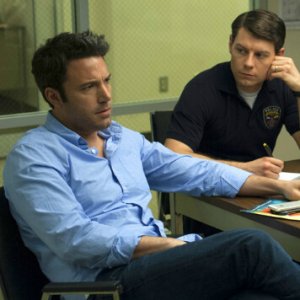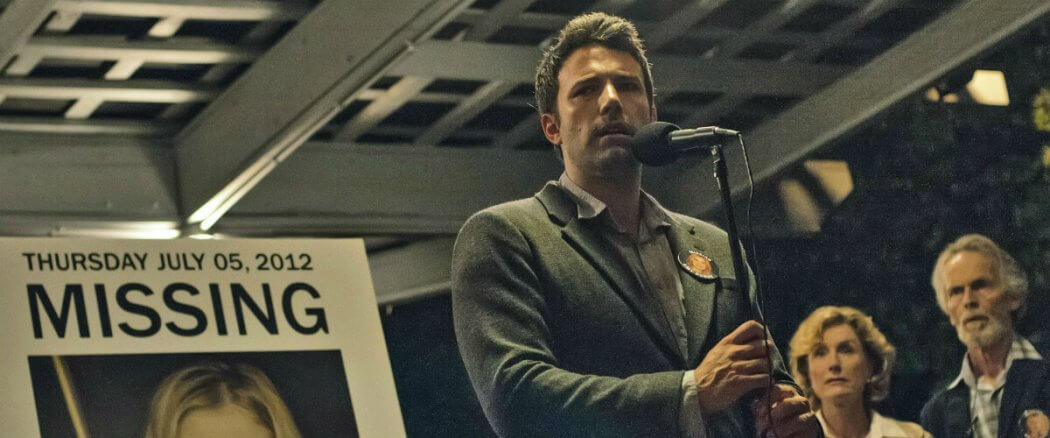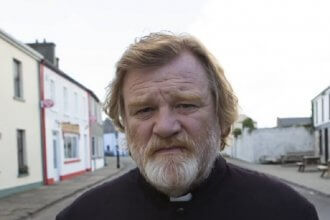If you’re into a psychological thriller of the kind to make Hitchcock happy, then consider Gone Girl for a cold, late winter’s night film. A chill and a thrill. The thrill is in following the character development of characters who are more mysterious (even to themselves) than may meet the eye. Mysteries within mysteries. The big one, though, for Gone Girl is this: Did Nick Dunne kill his wife Amy? And not just any Amy, this is “Amazing Amy,” a woman whose childhood was captured by her parents in a popular children’s series read by millions.
I’d recommend the film standing alone, but I confess to being a fan of the book. The book led me straight to the film; it tainted my cinematic experience but in all the best of ways. Gillian Flynn wrote the novel as a means to explore matters of love (and presumably madness?) within long-term relationships, but she also wrote the screenplay for the film, so I don’t feel so bad in saying that this review does a little tango with the book and film, some compare and contrast. The film, though, is David Fincher’s (Fight Club), and there’s no mystery to that; it’s got his fingerprints all over it.
Book vs. Film
Let me get a quick gripe out of the way, a beef against the film. The chemistry in the film between Nick and Amy didn’t convince me. In the book, you feel the love — or since “love” is something we come to question, let’s call it “attraction” or “chemistry.” In the film I didn’t see what sparks might have brought these two together, but then again this may have been deliberate by Fincher, because as the story deepens, we question what “love” meant to these two. In comparing the film and the novel, one theme is that the film is ambiguous where the book might be more clear.
 And by way of full disclosure, I’m not someone to automatically assume the book is better. Anthony Minghella’s The Talented Mr. Ripley, for example, was clearly superior to the novel on which it was based (in my humble opinion). There are subtle things that a picture can do, like in Gone Girl how Fincher uses the lighting of camera flashes. Nick is feeling pressure from the press, because Amy is missing and this thing’s gone national. “Nick! Did you kill your wife!” Public opinion is going back and forth; it’s as delicate as walking a trapeze, and Nick’s breaking. Coming in and out of the door, flashbulbs glance off of walls, invasive, symbolic of Nick’s inability to escape the scrutiny that is closing in on him.
And by way of full disclosure, I’m not someone to automatically assume the book is better. Anthony Minghella’s The Talented Mr. Ripley, for example, was clearly superior to the novel on which it was based (in my humble opinion). There are subtle things that a picture can do, like in Gone Girl how Fincher uses the lighting of camera flashes. Nick is feeling pressure from the press, because Amy is missing and this thing’s gone national. “Nick! Did you kill your wife!” Public opinion is going back and forth; it’s as delicate as walking a trapeze, and Nick’s breaking. Coming in and out of the door, flashbulbs glance off of walls, invasive, symbolic of Nick’s inability to escape the scrutiny that is closing in on him.
More props to the film: The Nick character is played by Ben Affleck, and Affleck is perfect. There are some things in life you can’t see yourself ever saying, especially to commit to writing in a published review, and for me, “Affleck is perfect” is one of them. But he’s the perfect Nick. A good looking guy who grew up in Missouri, Affleck as Nick is part savvy NYC writer, part simpleton who is in way over his head and seems to be a step or two behind.
Love and Pretense
One thing I particularly appreciate about Gillian Flynn’s novel is that she digs deep into the complex issues that face individuals within a long-term relationship. She does this while keeping the reader highly entertained and eager to see what unfolds on the next page. Entertaining-while-provoking is a combination I admire and appreciate from an author.
“We were happy, pretending to be other people. We were the happiest couple we knew.”
There’s an almost seemingly impossible reconciliation in a long-term relationship that everyone seems to face. We begin a relationship sincerely enough, wanting, on the one hand, to be a good partner, to be that person who our partner wants and needs, to give selflessly. On the other hand, we risk pretending, we risk molding ourselves into an image that makes the other person happy. Year after year, over a long enough time period, we start to wonder who we really are. If we pretend long enough, do we become the role we’ve been playing? Or does there come a point where the shit just hits the fan?
 It makes for a compelling novel and film, and Hitchcock, of course, would be proud. From the perspective of faith, the questions raised are deeper still, because the faith of Christ is one of love. There is no greater command, no higher aspiration, no deeper realization of the soul than to love selflessly; but when is selfless love simply pretense and pretend? If love is self-less, and we actually check out and don’t bring our “self” to the gift of love, then it seems like this is a hollow love. Surely authentic love brings one’s whole self, fully and completely, holding no part of one’s self back. On the other hand, isn’t love selfless? You see my conundrum.
It makes for a compelling novel and film, and Hitchcock, of course, would be proud. From the perspective of faith, the questions raised are deeper still, because the faith of Christ is one of love. There is no greater command, no higher aspiration, no deeper realization of the soul than to love selflessly; but when is selfless love simply pretense and pretend? If love is self-less, and we actually check out and don’t bring our “self” to the gift of love, then it seems like this is a hollow love. Surely authentic love brings one’s whole self, fully and completely, holding no part of one’s self back. On the other hand, isn’t love selfless? You see my conundrum.
The film (like the novel) contains flashbacks from Amy’s diary, and the viewer/reader gets to hear journal entries from Amy herself that continue to expand (and call into question) what we know about Nick and Amy. We see the relationship from Nick’s perspective, then Amy, then back again. Back and forth. The deeper we go, the more confusing it gets, but one thing that’s clear is that there is an inherent vulnerability to long-term relationships, to love itself, and watching a film about someone who may be involved in a long-term relationship with a sociopath brings that point home. Sociopath or no, the vulnerability of love feels dangerous.
It isn’t easy to walk the way of love, like Christ. I often fail to appreciate this fact. Love is, in fact, the most demanding, frustrating, and dangerous of all of life’s endeavors. It’s the central call, though, at the heart of any faith journey, and the ability to love is the greatest experience of liberation, both personally and socially.
Did Nick Dunne Kill His Wife?
You can’t help but get hooked into this film of domestic noir. Book or film, Fincher and Flynn keep you on the edge of your seat, waiting for the next clue or the next journal entry. But when you finally find out the truth, then you realize that things are about to get even more compelling.




